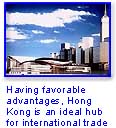
After 1997, Hong Kong remains the free market policies attracting international corporations continue to invest in Hong Kong. Its low tax regime, an excellent regulatory framework, an independent judiciary and powerful anti-corruption enforcement acted as a magnet, which provides favorable conditions for people to do business in Hong Kong.
 Free flow of capital is safeguarded as no foreign exchange controls.
Free flow of capital is safeguarded as no foreign exchange controls.
 No restrictions on foreign currency, and the Hong Kong dollar remains steady, as its value is pegged by statute to within a small margin of HK$7.78 to the US dollar.
No restrictions on foreign currency, and the Hong Kong dollar remains steady, as its value is pegged by statute to within a small margin of HK$7.78 to the US dollar.
 Hong Kong renders a level of playing field for all who trade in Hong Kong.
Hong Kong renders a level of playing field for all who trade in Hong Kong.
 Low tax rate relative to other countries. Corporate profits tax is 16% and salaries tax is calculated at a progressive rate.
Low tax rate relative to other countries. Corporate profits tax is 16% and salaries tax is calculated at a progressive rate.
 No duty on goods other than alcohol, tobacco and certain petroleum products. Capital gains and dividends are not taxed, nor are revenues earned offshore.
No duty on goods other than alcohol, tobacco and certain petroleum products. Capital gains and dividends are not taxed, nor are revenues earned offshore.
 Hong Kong's tough stance against corruption in all business or personal dealings continues unabated, with the post of Commissioner Against Corruption identified as one of the most important in public service.
Hong Kong's tough stance against corruption in all business or personal dealings continues unabated, with the post of Commissioner Against Corruption identified as one of the most important in public service. 
 To give additional assurance to overseas investors after 1997 that their investments in Hong Kong will be adequately protected, Hong Kong is negotiating and concluding its own Investment Promotion and Protection Agreements (IPPA) with overseas countries. Hong Kong's current IPPA programmes covers eighteen major investment partners.
To give additional assurance to overseas investors after 1997 that their investments in Hong Kong will be adequately protected, Hong Kong is negotiating and concluding its own Investment Promotion and Protection Agreements (IPPA) with overseas countries. Hong Kong's current IPPA programmes covers eighteen major investment partners.
 Government departments offer advice and resources for new and established companies in Hong Kong, as do overseas organizations with offices in the SAR
Government departments offer advice and resources for new and established companies in Hong Kong, as do overseas organizations with offices in the SAR

